by Heather Kent | Aug 21, 2015
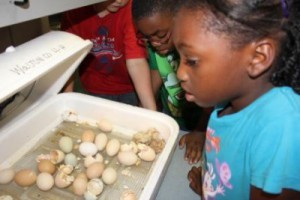
4-H embryology is a great way for school youth to learn about STEM and agriculture
For more than 100 years, 4-H clubs have been (and still are) the backbone of our youth development program. But did you know that 4-H also provides opportunities for youth to participate in programs during and after school? Not all youth have access to transportation to and from club meetings. 4-H school programs are a great way for those youth to glean the benefits of 4-H and to learn about other opportunities to be involved longer term.
Some examples of 4-H School programs offered in the 4-H Panhandle include:
Sometimes school programs such as 4-H Embryology or 4-H Tropicana Public Speaking are taught by teachers, using 4-H curriculum and resources with support from the 4-H Extension Agent. Other programs are coordinated with a team of volunteers and 4-H staff (such as 4-H Ag Awareness or Ag Literacy Week). County Extension offices offer training, curriculum, and equipment for teachers and volunteers interested in leading 4-H programs at local schools. In addition, these programs receive support from extension agents and UF IFAS specialists with subject matter expertise, so you can be sure that youth are receiving the most up to date, non-biased information available.
If you have skills that you would like to share with the next generation, consider partnering with your local school and 4-H program. To find out which opportunities are available in your area, contact your local UF IFAS County Extension Office or visit http://florida4h.org/volunteers.
by Melanie Taylor | Jul 31, 2015

Stay hydrated to beat the heat!
Summer is in full swing and our part of the country is very hot. When the temperature rises, proper hydration is extra important. You need to provide your body with the fluid that it needs to stay healthy. Water regulates many different body processes, including body temperature, digestion, and heart rate. It also cushions and protects our internal organs and joints. When we do not get enough of it, our bodies can suffer. We lose water from our bodies every time we breathe, sweat, or urinate. In fact, it’s estimated that you can lose up to 4 cups of water during an hour of exercise in the heat. This water loss can lead to dehydration.
Signs of dehydration include:
- Little or no urine, or dark urine
- Dizziness, or lightheaded feeling
- Dry mouth
- Sleepiness or fatigue
- Extreme thirst
- Rapid breathing
- Rapid pulse
- Headache
- Confusion
- Cramping
Ultimately, dehydration can lead to extreme thirst, confusion, heat stroke, loss of consciousness, and death. So, how can you manage staying hydrated in the heat of summer? One of the key answers is not to wait until you are thirsty. Drink water regularly! Food can also provide some of the water you need every day- especially food like watermelon, soup, milk, lettuce, and strawberries. Sugar-sweetened sports drinks or beverages with added minerals, vitamins, or electrolytes are NOT necessary unless you are a competitive athlete or in heavy training for an athletic event.
Tips for staying hydrated:
- Keep a bottle of water with you during the day. Purchasing bottled water is expensive and creates plastic bottle waste. Carry a reusable water bottle and fill it from the tap instead.
- If you do not like the taste of plain water, try adding a slice of lemon, lime, or another type of fruit to your drink.
- Be sure to drink water before, during, and after a workout.
- When you are feeling hungry, drink water. Thirst is often confused with hunger. True hunger will not be satisfied by drinking water.
- If you have trouble remembering to drink water, drink on a schedule. For example, drink water when you wake up; at breakfast, lunch, and dinner; and when you go to bed. Or drink a small glass of water at the beginning of each hour.
- Drink water when you go to a restaurant. It will keep you hydrated, and it is free!
Be safe this summer and stay hydrated, so you will enjoy your outdoor time. Also, remind you family and friends to drink water too. You will all feel better and have more fun!
by Julie Pigott Dillard | Jul 24, 2015
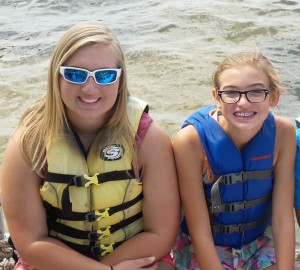
Do you know how to properly fit a life jacket? Photo credit Washington County Extension.
Like Dr. Seuss said, “It’s fun to have fun, but you have to know how.” With over 11,000 miles of rivers, streams and waterways, 4,136 miles of beaches, coastlines, and shorelines, and 4,308 square miles of total water area, Floridians can enjoy time on the water year-round. Whether you’re out cruising the river, fishing for Red Snapper in the gulf or wakeboarding on a spring-fed lake, you should be thinking about water safety.
The number one rule in boating and water sports safety is to wear a life jacket. According to safetykids.org, 77% of fatal boating accidents were drowning victims, and 84% of those victims weren’t wearing life jackets. Florida law states that all children six years of age and under must wear a life jacket, but all youth can benefit from wearing a properly sized, snug fitting U.S. Coast Guard approved life jacket to ensure safety in and around water and while boating.
You might think that life jackets are useful only in rough conditions, but one-half of all water related fatalities happen in calm waters. So, when would a life jacket save lives?
- When a boat has capsized in rough water.
- When a boat sinks in heavy sea conditions.
- When a person is thrown from a boat after a collision.
- When an injury occurs.
- When a person is tossed into freezing water.
- When a person is thrown off balance and into the water fishing.
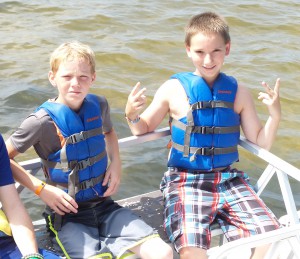
According to Florida law, youth ages 6 and under must wear a life jacket, but everyone can benefit from wearing one. Photo credit Washington County Extension.
- When a carbon monoxide fumes cause unconsciousness.
- When a person is unable to swim because of heavy, waterlogged clothing.
To ensure you have a properly fitting life jacket:
- Choose a life jacket for your size and weight.
- Correctly fasten all straps and buckles.
- Hold your arms up in the touchdown pose.
- Ask someone to gently pull up on the tops of the arm openings.
- Check there is no excess room above the arm opening and to make sure the jacket doesn’t ride up over your chin or face.
Remember, fun items like pool noodles, floats and water wings should never be substituted for a well-fitting life jacket. Consider a life jacket like any other piece of sporting equipment that requires maintenance. Check it yearly for wear and tear and for buoyancy, and throw away leaky, faded, waterlogged and misshapen life jackets. Football players wear helmets, drivers and car riders wear seat belts – responsible boaters should wear life jackets.
If you have a passion for fishing or boating, consider becoming a 4-H Sports fishing project leader. We have some wonderful curriculum and resources for volunteers who would like to share their fishing expertise with youth. To find out more, contact your local UF IFAS Extension Office, or visit http://florida4h.org/volunteers.
Your opinion matters! Take this short survey to help us improve our blog: https://ufl.qualtrics.com/SE/?SID=SV_3gtLKjqia3F75QN
by Stefanie Prevatt | Jul 17, 2015
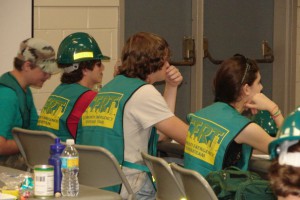
4-H Teens learn how to respond to emergencies as well as careers related to emergency management and safety through the CERT program. Leon County Extension photo.
It’s mid-summertime. Tourists are flocking to beaches like seagulls to bread. Summer camps and in full swing and so are daily afternoon thunderstorms. In Florida, torrential rain, lightening, and thunderstorms are so common place they often aren’t treated with due respect. However, one group of 4-H teens and adult volunteers in Leon County have been working with disaster preparedness for six years and understands just how quickly Mother Nature can turn from beautiful to dangerous.
The Teen Community Emergency Response Team (CERT) is a unique organization that teaches participants leadership, readiness and response skills. Teens recognize hazards, man-made or natural, in order to prevent a possible disaster. Teens participating in the program are trained to safely respond to an emergency and assist victims without endangering themselves. Examples of what youth learn are:
- extinguishing small fires
- conducting light search and rescue
- setting up medical treatment areas
- assisting emergency responders
Members of the Leon County 4-H Teen CERT Club have been actively involved in natural disaster preparedness for four years. While not all members are official teen CERT members, all youth are active in learning about disasters and how to be the most prepared. Members are actively engaged in their community – passing out literature on disaster preparedness. In addition, members of 4-H Teen CERT participate in an annual first responder training exercise held at the Tallahassee Regional Airport. Our youth pose as victims of a disaster and are given the opportunity to interact with working first responders. This opportunity allows youth to interact with professionals in the field as well as understand the details that go in planning and preparing for emergency situations.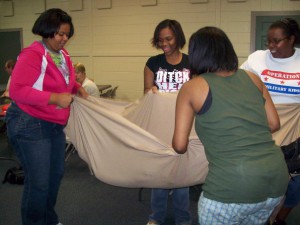
Teen CERT has been a wonderful addition to the Leon County 4-H program. Adults and youth who participate are more aware of situations that could potentially pose harm to members and bystanders. Youth are always quick to help adults remember the first aid kit and are always willing to lend and extra hand. In addition to training youth who are ready and able to respond, CERT has trained leaders who give back to their club and organization!
For more information about Teen CERT, please visit: https://www.fema.gov/community-emergency-response-teams/teen-community-emergency-response-team.
UF IFAS Disaster and Recovery information (includes a homeowner handbook and hurricane preparedness for homeowners and ag producers)
Want to help youth in your community learn how to respond to emergencies or about careers related to community safety? If you would like to start a 4-H Teen CERT club, or serve as a speaker or project leader for 4-H disaster preparedness programs, please contact your local UF IFAS Extension Office or visit http://florida4h.org/volunteers.
by Monica Brinkley | Jul 10, 2015
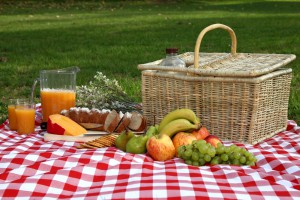
Keep your picnics safe this summer!
Summer months are a great time for picnicking with family and friends. Flies and other insects can be rather annoying, but the “bugs” you can’t see can be extremely harmful. Bacteria love the warm humid weather and grow more quickly in the summer than any other time of the year. The number of people who get sick during the hot months of the year is much greater. So read over the following tips to beat bacteria at your summer picnic.
Keep it Clean!
■ Find out if your picnic destination has a source of safe drinking water. If not, bring water or moist towelettes for cleaning hands and surfaces.
■ Always wash your hands with warm, soapy water for 20 seconds before and after handling food. Unwashed hands are a major cause of foodborne illness. Use moist towelettes if hand-washing facilities are not available.
■ Be sure raw meat and poultry are wrapped securely to prevent their juices from cross-contaminating other foods in the cooler.
■ Pack enough clean utensils for both eating and serving food. Don’t use the same utensil or platter for raw and cooked meat and poultry. Disposable plates and utensils help prevent cross-contamination.
■ Keep foods covered to prevent insects from enjoying your lunch!
Keep Cold Foods Cold!
■ Keep perishable foods cool by transporting them in an insulated cooler with plenty of ice or frozen gel packs. Perishable foods include meat, poultry, seafood, eggs, dairy products, pasta, rice, cooked vegetables, and peeled and cut fruits and vegetables.
■ Pack the cooler just before leaving home. Foods chilling in your refrigerator should be placed directly in your cooler with ice or frozen gel packs.
■ Avoid frequently opening coolers containing perishable food. It’s a good idea to store beverages and perishable foods in separate coolers.
Keep the cooler in an air-conditioned vehicle during travel and in the shade at the picnic site.
Some other resources to help or share:
UF IFAS Picnic Safety Video
UF IFAS Food Safety Factsheet for Potlucks
Fun Picnic Ideas to Try this Summer
Do you have a passion or skills that you would like to pass on to the next generation of parents, employees, civic leaders, and decision makers? 4-H needs caring adults from a wide variety of backgrounds, skills and experiences. For more information, contact your local UF IFAS Extension Office, or visit http://florida4h.org/volunteers.
Your opinion matters! Please take this short survey to help us improve our blog https://ufl.qualtrics.com/SE/?SID=SV_3gtLKjqia3F75QN
by Yolanda Goode | Jul 3, 2015
 They wiz, sparkle, pop and twirl. They thrill and sometimes scare us. Do you recall the first sparkler that you got to hold? Was it an exciting, magical experience, or did you get burned? Do you really know how hot a sparkler can get? Most children are rarely concerned with safety, It is up to the adults to keep them safe. This is especially true when it comes to fireworks. We know that as the Fourth of July is approaching, many will have their own personal fireworks show. Believe it or not, over 11,000 injuries occur each year (more than half of them happen around Forth of July celebrations).
They wiz, sparkle, pop and twirl. They thrill and sometimes scare us. Do you recall the first sparkler that you got to hold? Was it an exciting, magical experience, or did you get burned? Do you really know how hot a sparkler can get? Most children are rarely concerned with safety, It is up to the adults to keep them safe. This is especially true when it comes to fireworks. We know that as the Fourth of July is approaching, many will have their own personal fireworks show. Believe it or not, over 11,000 injuries occur each year (more than half of them happen around Forth of July celebrations).
Most cities offer a free fireworks show around this time of year. I highly recommend taking in city fireworks show and foregoing a personal one. You won’t have to worry about all the logistics of a personal fireworks display. You’ll just have to worry about getting a good viewing spot and the traffic. If you are still set on setting off fireworks, keep reading.
First of all, consider the Law. Are you able to purchase and launch fireworks in your town or city? Do you know if the fireworks you have purchased are legal in Florida? Many of the fireworks sold at road side stands are not, such as firecrackers and roman candles. Setting off illegal fireworks can result in up to a year in prison and $1,000 in fines. Second, work out safety procedures ahead of time. Carefully consider these three safety areas; personal, property, and environment.Here’s a checklist to help ensure a fun but SAFE fireworks experience for friends and family (also available as a printable PDF)
Personal Safety:
- Do you have a first aid kit on hand? Sparklers can burn up to a temperature of 2,000 thousand degrees (glass melts at only 900 degrees).
- Do you have a fire extinguisher and do you know how to use it?
- Is water available to douse dud fireworks or to put out a fire? Put another adult in charge of dousing dud fireworks and to be on “spark” lookout. Have hoses and water buckets at the ready.
- Are you familiar with the fireworks you plan to shoot? Only handle fireworks you know and heed all warnings. Leave the professional (or illegal) fireworks to the permitted professionals.
- Have you refrained from alcohol? Alcohol and the handling of fireworks is not a good mix.
- How will you ignite the fireworks to protect yourself if it goes off before it should? Make sure to not place your body over a firework when you are lighting it.
- Sometimes fireworks do not go off like they should. Leave it alone for several minutes to be sure it really is a dud. Don’t try to relight it. Douse with water before disposing of it.
- Have you communicated safety ground rules to the guests (and especially the children)?
- Stay in the clearly marked safe zone
- Adults only should handle all the fireworks
- It is not recommended that children handle fireworks. If a child is given a sparkler, he should be carefully monitored at all times.
Property Safety:
- Does the launch area have a large enough radius to prevent fireworks from landing on any structures, such as a house, garage, or vehicle?
- Have you informed your neighbors? It is courteous to inform your neighbors when you plan to host an event especially one that involves fireworks.
Environmental Safety:
- Have you checked the weather? Has it been really dry in your area? Is there a temporary ban on burning? Will it be windy?
Let not your event be the cause of the story being told about how Uncle Gump lost the tip of his finger. We also don’t want to have to replace our neighbor’s grass or garage. Keep it fun while being safe and share these tips with your friends. If you would like great information on how to photograph fireworks, see our archived article on fireworks photography by Georgene Bender.
Here are some additional links on fireworks safety that you may find helpful:
Next week, Monica Brinkley will share food safety tips for your next picnic or barbeque! Your opinion matters to us- please take this short survey to provide feedback to help us improve this blog https://ufl.qualtrics.com/SE/?SID=SV_3gtLKjqia3F75QN.








